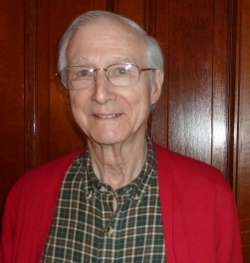 by OPC Past President Bill Holstein
by OPC Past President Bill Holstein
The OPC is saddened by the passing of OPC Past President President John Corporon on Friday, Feb. 4 at the age of 92. “Jack,” as he was called, had been suffering a variety of health ailments for months, in particular arthritis. He was predeceased by his wife, Harriet. Both from Kansas, they were married for 63 years. There will be no memorial service or wake, his son, David, told former OPC Executive Director Sonya Fry, who like the Corporons lives on Tenth Street in Park Slope, Brooklyn.
A full obituary can be found here.
Here are some reflections on his life and career from Bill Holstein and Sonya Fry:
Jack was such a fine journalist and gentleman, two words that don’t always go well together. He succeeded me as OPC president in 1996 and gave the club a big push. We were still recovering with our brush with bankruptcy and Jack was an effective dinner chair and fundraiser. He persuaded Katherine Graham of The Washington Post for example, to speak at our dinner. That helped us build back prestige after years of wandering in the wilderness. Jack was also involved in the OPC Foundation for as long as I have been, perhaps longer.
One of the factors that drew both of us to the OPC and the OPC Foundation was our respect for and loyalty to Hubert Lamar (“H.L.” or just “Steve”) Stevenson, the hard-charging, hard-drinking Southerner who worked his way up the ranks at United Press International to become editor-in-chief. Stevenson called me in late 1978 to launch my UPI career in Hong Kong and Beijing and I was always thankful for my big break.
But his connection with Corporon went back much further. Corporon’s career started in 1955 when he was hired by United Press (it had not yet merged with the International News Service to create UPI) in New Orleans. He became the Baton Rouge correspondent in 1956 and exposed one of the biggest stories of his career—he revealed a pattern of Black voter suppression in upstate Louisiana. His reporting resulted in federal agents restoring voting rights for Black voters in the area.
Stevenson was UP bureau chief in Jackson, Mississippi, at the time. “I felt a bond with Steve because we had common adversaries as we covered raging desegregation issues in Louisiana and Mississippi,” Corporon wrote for the OPC’s History Project. “Members of our respective legislatures monitored news coverage of racial issues in newspapers and broadcast media. If our coverage appeared to some editors as pro-integration, UP would get complaints…UP did not take sides on the segregation issue. We attempted to play it down the middle.”
Corporon worked his way up the career ladder to become vice president and news director for the New York television station, WPIX, a position he held for 24 years until his retirement in 1996, when he became OPC president. In the early 1990s, when Steve was president of the OPC, Corporon and I were both on the board. These meetings were often acrimonious with clashing personalities. The foundation was chaired at the time by Henri Gellerman, a cantankerous German who had been captured in World War II and forced (or persuaded) to become a translator for Allied forces. He refused to tell anyone what he was doing with the foundation and the roughly $10,000 it had. While OPC president, Stevenson fought to restore the foundation as well. They were able to present only two $1,000 foundation scholarships a year and all the winners came from the New York City area. The foundation couldn’t afford to fly anyone to New York.
I often wondered what compelled Corporon to stay engaged with the OPC and the OPC Foundation for so many years even though he had never been a foreign correspondent. I always assumed it was his respect for Steve. But Sonya Fry had a better explanation. “I think that Jack was totally interested in news, foreign and domestic, right up to the end,” she wrote. “Stevenson may have urged him to join, but I think it was his interest in news generally and not out of loyalty.
“Jack’s wife, Harriett, was fluent in French and they often traveled to Europe–Italy, France, Russia and even Ukraine,” Fry wrote. She visited Corporon in his final days. “In our last visit, we talked about the exodus from Afghanistan, Ukraine, Russia, Putin and his games, funny travel stories, and the like. He could no longer read nor use the computer, but he did keep up with world events on TV.”
Even though she had a slightly different explanation for Corporon’s long involvement than I did, she said, “I would totally agree that Jack was a devoted journalist and gentleman–generous and loyal.” Those are two other words—generous and loyal—that are not used to describe every journalist’s life and career.
